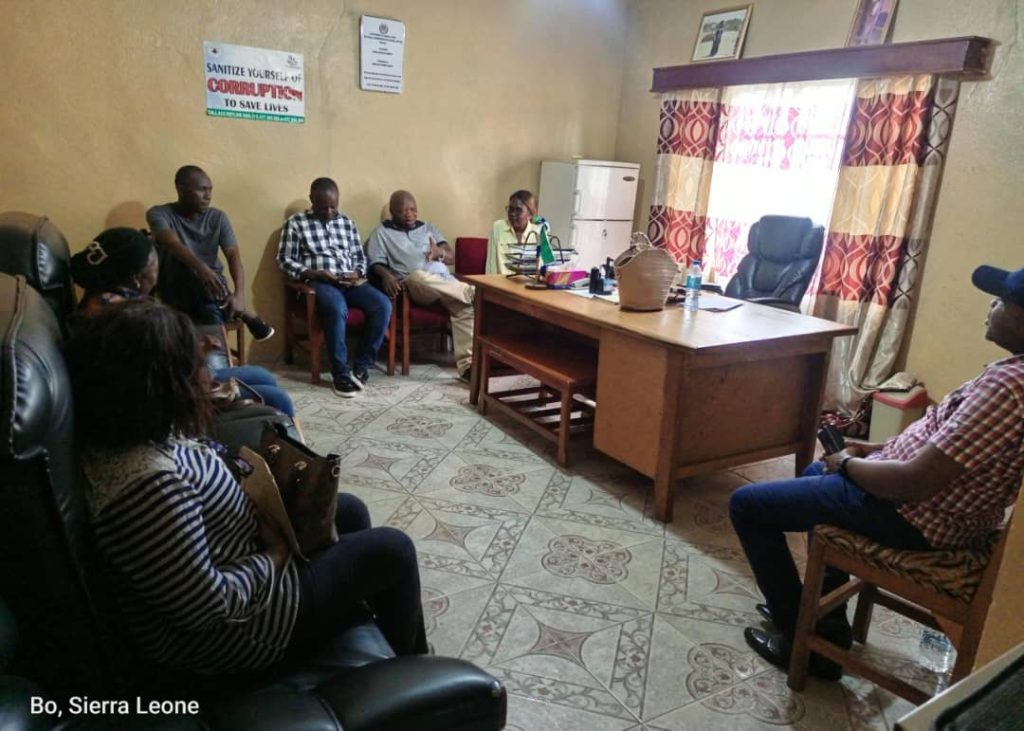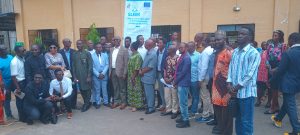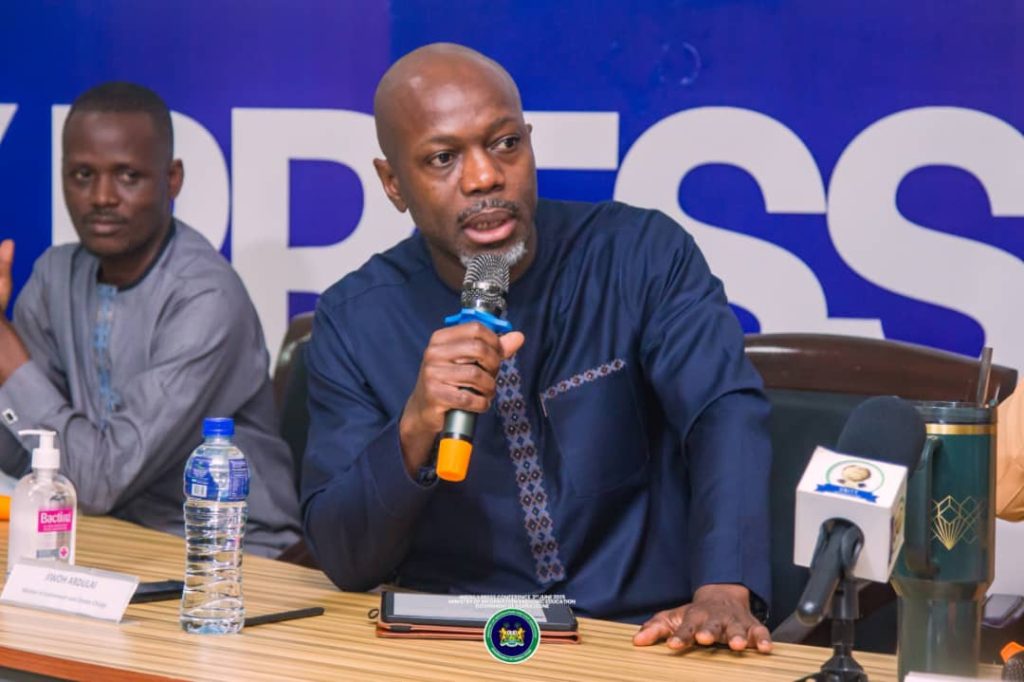Deputy ACC Commissioner Ensures Transparency in Emergency Cash Transfer Project in Bo

On August 28, 2024, Augustine Foday Ngobie, the Deputy Commissioner of the Anti-Corruption Commission (ACC), conducted a significant oversight visit to Bo District as part of a wider inspection tour across various districts benefiting from the Emergency Cash Transfer Component of the Productive Social Safety Net and Youth Employment (PSSNYE) project. This initiative, launched in response to the socioeconomic challenges facing vulnerable populations, aims to provide financial assistance to the elderly and marginalized groups across Sierra Leone.
During his visit, Deputy Commissioner Ngobie met with the Regional Team of the National Commission for Social Action (NaCSA), the lead agency responsible for implementing the project. In his remarks, he underscored the ACC’s unwavering commitment to ensuring that the project is executed fairly and transparently, without any malpractices. He highlighted the ACC’s active role in deploying project staff to oversee the Grievance Redress Mechanism (GRM), which is designed to address any complaints or issues arising during the implementation process.
Ngobie explained that his regular on-the-spot checks and interactions with stakeholders are critical to validating that the project is conducted efficiently and without impediments. He emphasized that such oversight is essential for maintaining public trust and ensuring that the funds reach the intended beneficiaries.
“We are aware that a significant number of people have been served under Component 1A,” Ngobie stated, “but the data and information we gather are vital for ongoing improvements, ensuring that all districts have equitable access to the program’s benefits.” His remarks reinforced the importance of continuous monitoring and data collection to enhance the program’s impact and reach.
Aminata Vandi, the Regional Coordinator for the South at NaCSA, welcomed the Deputy Commissioner’s visit and provided an update on the status of the Social Safety Net (SSN) Component 1A payments. This component, managed under the Ministry of Labour and Social Security, specifically targets the elderly, a group identified as particularly vulnerable. Ms. Vandi acknowledged the challenges faced by many beneficiaries, such as the long distances they must travel to receive their payments. She noted that while the issue of accessibility has been recognized, many elderly beneficiaries continue to make significant sacrifices to collect their payments due to a lack of closer payment facilities.
To address these concerns, she mentioned that plans are underway to establish a more centralized payment system to reduce travel burdens and improve access for beneficiaries. “At the start of the payment process, we realized the distance challenge,” she said, “but some beneficiaries, driven by necessity, made substantial efforts to reach payment centers.”
Ms. Vandi also highlighted that during last year’s registration process, provisions were made to include alternate beneficiaries, as many of the primary recipients are elderly and face mobility challenges. “Some beneficiaries are 75 years and above, so we had to make arrangements to ensure they are not left out,” she added. However, she also pointed out that communication remains a significant challenge, as some beneficiaries are unaware that payments are ongoing, despite efforts to disseminate information. “Although the majority have been paid, there are still some who have not received the message,” she noted.
Charles Macarthy, the District Coordinator for NaCSA in Bo, provided additional insights into the local implementation of the project. He reported that out of 899 beneficiaries enrolled in Bo District, 665 have been processed, 563 have received their payments, and 162 cases are still pending under the GRM. He elaborated that some beneficiaries have received their payments directly via their SIM cards and that there is a need to reconcile these transactions with Orange, the telecommunications company managing the payment disbursement, to ensure that all payments are accurately accounted for.
Macarthy’s report underscores the logistical complexities and administrative hurdles in ensuring that all beneficiaries receive their payments promptly and without errors. He emphasized that these challenges require ongoing attention and coordination among all stakeholders.
In response to the concerns raised by the NaCSA team, Deputy Commissioner Ngobie assured them that all issues would be communicated to the relevant authorities and that the ACC would closely monitor the situation to ensure that corrective actions are taken where necessary. “Whatever insights we gather, we will share to ensure other districts also benefit from the lessons learned here,” he affirmed.
Ngobie’s commitment to oversight and transparency reflects the ACC’s proactive approach to preventing corruption and ensuring the efficient distribution of resources. His assurance to the NaCSA team highlights the ACC’s role in safeguarding the integrity of the program and promoting accountability at all levels.
The Emergency Cash Transfer Component of the PSSNYE project provides financial assistance to vulnerable populations, with each beneficiary under Component 1A receiving 1,047 Leones. The program currently covers ten districts across Sierra Leone, benefiting thousands of elderly and disadvantaged citizens. The initiative is part of a broader effort to enhance social protection and promote economic stability in the wake of ongoing socioeconomic challenges.
The visit of Deputy Commissioner Ngobie to Bo District highlights the ACC’s dedication to ensuring that the program is implemented transparently and effectively, with a focus on equitable distribution and impact. His engagement with local stakeholders and beneficiaries demonstrates a commitment to accountability and the continuous improvement of social protection initiatives in Sierra Leone.
As Sierra Leone continues to grapple with economic and social challenges, the efforts of the ACC, in partnership with NaCSA and other stakeholders, are crucial in ensuring that social safety net programs reach those in need. The ongoing monitoring and oversight by the ACC are vital in maintaining public trust and confidence in these programs, ensuring that they serve their intended purpose of supporting the most vulnerable members of society. Deputy Commissioner Ngobie’s visit to Bo serves as a reminder of the importance of transparency, accountability, and collaboration in the pursuit of social and economic justice for all Sierra Leoneans.





